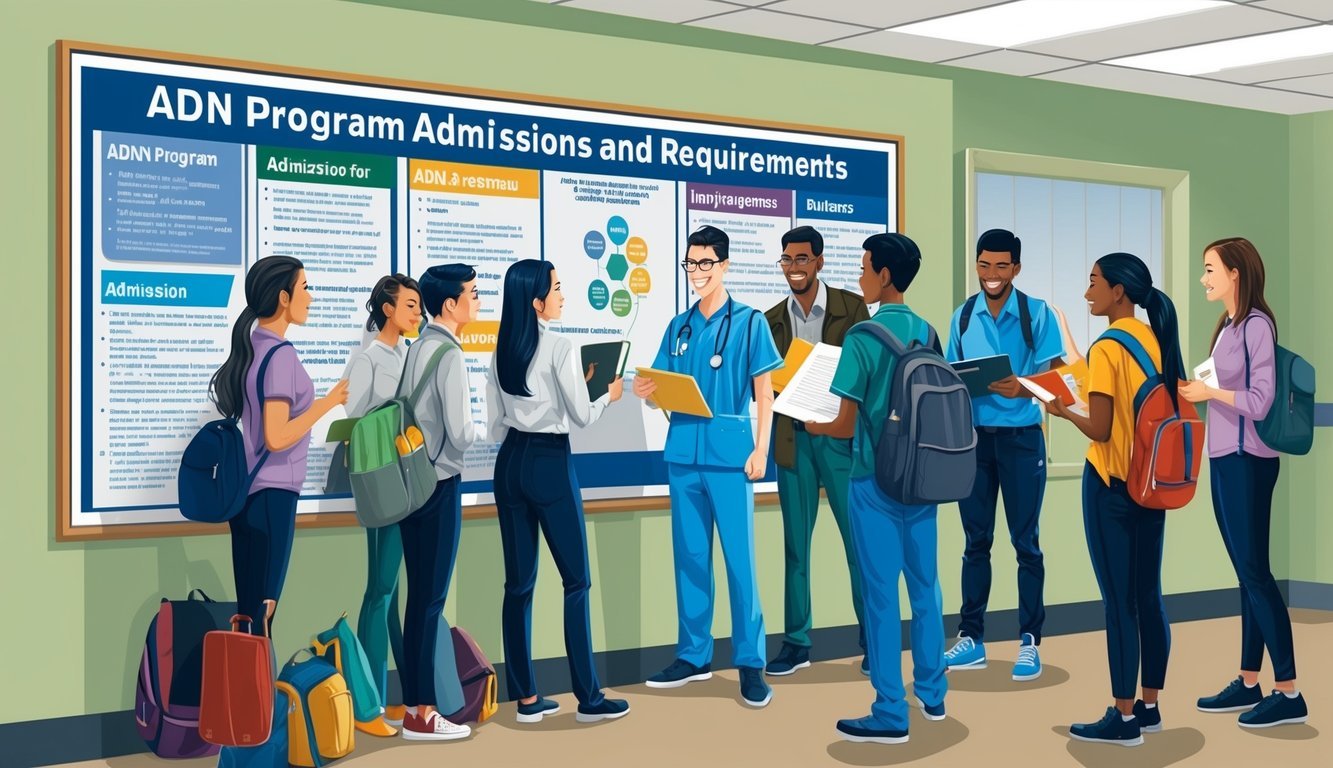An associate degree in nursing (ADN) can be your gateway to a fulfilling career in healthcare.
With a two-year commitment, you can prepare for the NCLEX-RN examination and enter the nursing profession as a registered nurse (RN).
Understanding the schools that offer quality ADN programs is essential in making an informed decision about your education.
When choosing a nursing school, consider factors like program accreditation, NCLEX pass rates, and support services for students.
Many institutions offer ADN programs that combine classroom learning with hands-on training, preparing you for real-world patient care.
In this article, you’ll explore various options, admission requirements, and what you can expect from the curriculum.
Investing in your education as a nursing professional also includes understanding your financial options and potential career paths post-graduation.
As you navigate through the details of different programs, the right choice can lead to a rewarding career in nursing, with ample opportunities for advancement.
Key Takeaways
- ADN programs usually take two years to complete and lead to RN licensure.
- Choose schools based on accreditation, NCLEX pass rates, and available support.
- Financial aid and loan options can help ease the cost of your education.
Overview of Associate Degree in Nursing (ADN) Programs
An Associate Degree in Nursing (ADN) is a two-year nursing program that prepares you to become a registered nurse (RN).
This degree is offered at community colleges, vocational schools, and some universities.
Key Components of ADN Programs
- Duration: Most ADN programs take 18 to 24 months to complete.
- Credits: Programs typically require around 60 credits, covering both general education and nursing-specific courses.
ADN Curriculum Elements
Your ADN curriculum will include a mix of theory and practical training.
Key subjects often covered are:
- Nursing fundamentals
- Anatomy and physiology
- Pharmacology
- Mental health nursing
Online ADN Programs
Many schools now offer online ADN programs.
These options provide flexibility if you have other commitments.
However, all programs will require in-person clinical experiences.
Program Costs
The cost of ADN programs varies widely.
Public colleges may charge between $6,000 and $20,000 for the entire program, depending on the institution.
Job Outlook
The demand for RNs remains high, making ADN programs a popular choice.
Graduates are eligible to take the NCLEX-RN, the licensing exam for registered nurses.
For more details on ADN programs, you can check out NurseJournal or Nurse.org.
ADN Program Admission and Requirements

To enter an Associate Degree in Nursing (ADN) program, you must fulfill specific admission requirements and complete prerequisite coursework.
Understanding these elements is critical for a smooth application process and future success in your nursing education.
Admission Requirements
ADN programs typically have a set of admission requirements to ensure that applicants are prepared for the challenges of nursing education.
Common requirements include:
- High School Diploma or Equivalent: You must have completed secondary education.
- GPA: Many programs require a minimum GPA, often around 2.5 to 3.0 on a 4.0 scale.
- Entrance Exam: Some schools require the TEAS (Test of Essential Academic Skills) exam or similar assessments to evaluate your readiness.
Additionally, you may need to submit letters of recommendation and a personal statement explaining your desire to pursue nursing.
Prerequisite Coursework
Prerequisite coursework is essential for ensuring you have a solid foundation for your ADN studies.
Requirements may vary by school, but common prerequisites include:
| Course | Description |
|---|---|
| Biology | Introduction to human biology, focusing on anatomy and physiology. |
| Chemistry | Basic chemistry principles, often with a lab component. |
| Psychology | Understanding human behavior, which is crucial in nursing. |
| Algebra | Basic math skills needed for medication dosage calculations. |
Before you apply, check with your desired program for any additional prerequisites, as some schools may have unique requirements.
Completing these courses at local healthcare facilities or community colleges can make the process more accessible.
Curriculum and Educational Content
The curriculum for an Associate Degree in Nursing (ADN) program focuses on essential nursing concepts, practical skills, and clinical experience.
You will study critical subjects that prepare you to provide safe and effective patient care as you progress through your education.
Core Nursing Courses
Core nursing courses form the foundation of your ADN program.
You will engage in subjects such as:
- Medical-Surgical Nursing: This course covers the management of patients with various medical conditions.
- Pharmacology: You will learn about medications, their effects, and safe administration practices.
- Mental Health Nursing: This subject explores behavioral health and mental health issues, preparing you for supportive roles.
- Community Health Nursing: You will study health promotion and disease prevention in community settings.
These courses are designed to ensure you develop both your nursing skills and your ability to think critically while caring for diverse patient populations.
Clinical Rotations and Simulation Labs
Clinical rotations and simulation labs provide valuable hands-on experience in real-world settings.
You will participate in:
- Clinical Hours: You must complete a specific number of clinical hours under the supervision of experienced nurses.
- Simulation Labs: These labs use advanced technology to replicate patient scenarios. It helps you practice skills safely in a controlled environment.
During clinical rotations, you will apply theoretical knowledge from your courses, working in different areas such as medical-surgical, mental health, and community health.
This mixture of clinical experience ensures you are well-prepared for your nursing career.
By immersing yourself in both academic and practical aspects of nursing, you will gain a comprehensive understanding of patient care.
Licensure and Examination

Obtaining licensure as a registered nurse is a crucial step after completing your associate degree in nursing.
The process includes passing the NCLEX-RN exam and meeting specific state board requirements.
NCLEX-RN Exam Preparation
The NCLEX-RN exam is a critical assessment for aspiring registered nurses.
This national test evaluates your knowledge and skills in nursing.
To prepare effectively, follow these steps:
- Study Resources: Use textbooks, online courses, and exam prep books specifically designed for the NCLEX-RN.
- Practice Tests: Take full-length practice exams to gauge your readiness. This will help familiarize you with the format and question styles.
- Study Groups: Joining a study group can enhance learning through shared knowledge and support.
Understanding the NCLEX-RN structure is essential.
The exam consists of multiple-choice questions covering a range of nursing topics, including pharmacology, patient care, and safety protocols.
High pass rates can reflect effective preparation, so focus on your study techniques and strategies.
State Board of Nursing Requirements
Every state has its own board of nursing that sets licensure requirements.
Typically, these include:
- Educational Credentials: Ensure your ADN program meets state educational standards.
- Criminal Background Check: Most states require a background check before granting licensure.
- Application Process: Submit your application, including proof of your nursing education and exam results.
Check your state’s board of nursing website for specific requirements, as these can vary significantly.
You can often find valuable resources and guidance on completing your application.
Staying informed about deadlines and documentation will ensure a smoother licensure process.
Career Opportunities and Advancement
The field of nursing offers numerous career paths and opportunities for growth.
An associate degree in nursing prepares you for various entry-level positions, as well as further education options to advance your career.
Entry-Level Nursing Positions
With an Associate Degree in Nursing (ADN), you can step into several entry-level nursing roles.
Common positions include:
- Registered Nurse (RN): Your primary role involves patient care, conducting assessments, and developing care plans.
- Home Care Nurse: You assist patients in their homes, providing personal care and support.
- Long-term Care Nurse: You work in nursing homes or rehabilitation centers, focusing on chronic conditions.
In these roles, you’ll work in diverse healthcare settings such as hospitals, outpatient clinics, and community health organizations.
Many nursing programs boast high job placement rates, often above 90%, which reflects strong demand in the healthcare sector.
RN-to-BSN Programs and Further Education
If you want to advance in your nursing career, consider pursuing a Bachelor of Science in Nursing (BSN) through an RN-to-BSN program.
This option allows you to build on your ADN education and broaden your expertise.
Benefits of obtaining a BSN include:
- Expanded Job Opportunities: Many employers prefer or require a BSN for certain positions, particularly in nursing leadership roles.
- Higher Earning Potential: RNs with a BSN often earn higher salaries than those with only an ADN.
You can find flexible online RN-to-BSN programs that cater to your schedule while providing additional skills in nursing practice, management, and critical thinking.
Employers increasingly value this higher level of education, making it a worthwhile investment in your future.
Financial Considerations and Support

When pursuing an Associate Degree in Nursing (ADN), you need to understand tuition costs.
Tuition can vary greatly depending on the school you choose.
Here’s a breakdown:
| Institution Type | Average Tuition Cost |
|---|---|
| Public In-State | $6,000 – $10,000 |
| Public Out-of-State | $15,000 – $20,000 |
| Private | $20,000 – $40,000 |
You should also consider additional fees.
These can include registration fees, books, and supplies, which may add several hundred to a few thousand dollars to your total costs.
Financial aid is available to help manage these expenses.
Here are some common options:
- FAFSA: Completing the Free Application for Federal Student Aid can unlock federal grants and loans.
- Scholarships: Many organizations offer scholarships specifically for nursing students. Check sites like Nursejournal for opportunities.
- Grants: Look for state and federal grants that do not require repayment.
You might also want to ask about the student-faculty ratio.
A lower ratio can mean more personalized instruction, which can enhance your learning experience.
This factor may not directly impact costs but can influence your educational success.
Researching and applying for financial aid early is crucial.
Be proactive to ensure you receive the support you need to succeed in your nursing education.
Frequently Asked Questions
This section provides valuable information about enrollment requirements, the differences between online and traditional programs, accredited institutions, top-rated schools, salary potential, and the relationship between an ASN degree and RN licensure.
What are the requirements to enroll in an Associate Degree in Nursing program?
To enroll in an Associate Degree in Nursing (ADN) program, you typically need a high school diploma or GED.
Other common requirements include a minimum GPA, completion of prerequisite courses in subjects like biology and chemistry, and passing an entrance exam.
Some schools may also require a background check or health screenings.
How do online Associate Degree in Nursing (ADN) programs compare to traditional on-campus programs?
Online ADN programs offer flexibility, allowing you to complete coursework at your own pace.
They often include virtual labs and simulations.
In contrast, traditional programs provide hands-on experiences in clinical settings.
Both paths lead to the same ADN degree, but your choice may depend on your learning style and personal commitments.
Which institutions are accredited for offering Associate Degree in Nursing?
Accreditation is important for ensuring the quality of nursing programs.
You should look for programs accredited by organizations like the Accreditation Commission for Education in Nursing (ACEN) or the Commission on Collegiate Nursing Education (CCNE).
You can check the ACEN website for a list of accredited programs.
What are the top-rated schools for pursuing an Associate Degree in Nursing?
Some of the top-rated schools for an Associate Degree in Nursing include community colleges and universities known for their nursing programs.
Institutions like Santa Rosa Junior College and Galen College of Nursing are frequently recognized for quality education and positive outcomes for graduates.
How does obtaining an Associate Degree in Nursing impact my salary potential as a registered nurse?
Holding an Associate Degree in Nursing can significantly impact your salary.
RNs with an ADN can earn an average annual salary that ranges between $55,000 and $75,000, depending on location and experience.
Pursuing a Bachelor of Science in Nursing (BSN) later can increase your earning potential further.
Can you become a registered nurse (RN) with an Associate of Science in Nursing (ASN) degree?
Yes, you can.
The ASN is equivalent to an ADN in terms of eligibility for the NCLEX-RN exam.
This exam is required to obtain your RN license.

